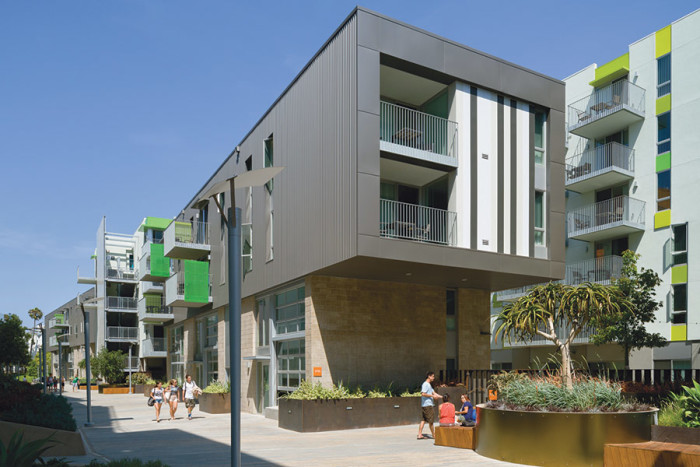
Citing concerns that the anti-development Land Use Voter Empowerment (L.U.V.E.) initiative would only exacerbate Santa Monica’s housing affordability crisis, the Southern California Association of Nonprofit Housing (SCANPH) voiced their opposition in a letter to the City Council last week.
In the letter, the executive director of SCANPH, a membership organization that supports the development and operation of affordable housing, warns that the initiative — which, if adopted in November, would require a popular vote for most new construction above two stories, or 32 feet — would hobble the city’s ability to tackle the growing housing affordability crisis and would do nothing to help address traffic concerns.
“Initiatives that add cost and complexity to projects are not the answer to addressing the regional housing affordability crisis or to reducing traffic and congestion,” SCANPH Executive Director Alan Greenlee wrote in the letter to the Council, dated June 20, 2016 [PDF].
“Other cities in California that have passed similar initiatives have fallen way behind in providing their regional fair share of housing and have had to defend themselves from numerous lawsuits,” he wrote.
The so-called LUVE initiative is similar to actions taken by more conservative coastal cities like Encinitas. In June 2013, voters in Encinitas narrowly approved Proposition A, which put a blanket cap on height and density of new buildings. However, Encinitas soon came under fire for violating state law, which allows density bonuses in new housing construction when the projects include affordable housing.
In July, the city of Encinitas settled and agreed to allow the density bonuses mandated by state law, but the suit still ended up costing the city $200,000. In the letter, Greenlee also noted the organization’s opposition to a similar anti-development measure that may be on the ballot in Los Angeles in March called the Neighborhood Integrity Initiative.
“The end result [of the L.U.V.E. initiative] would be that only the most well-funded developers would be able to fund the vote and the campaign,” Greenlee wrote, referring to the fact that the L.U.V.E. initiative would require nearly all new projects over 32 feet, or two stories, to be put to a public vote.
Greenlee’s concerns echoed that of other opponents of the initiative who have also noted they believe it goes too far.
The Los Angeles Times Editorial Board recently opposed the initiative as well, saying, “Putting virtually all developments before the voters would turn land-use decisions into political campaigns, where the question isn’t, ‘What’s best for the long-term good of Santa Monica?’ but rather, ‘What will pass muster with the few people who bother to vote?’ That is the opposite of real planning.”
Earlier this month, the League of Women Voters of Santa Monica issued a statement in opposition to the initiative after a lengthy study of the language.
“The initiative, when taking all of its provisions into account, would not result in an increase in transparency, engagement, voter empowerment, responsiveness, accountability, and democratic process in the City of Santa Monica,” the League wrote in the two-page statement [PDF].
Opposition to the initiative has been steadily growing since Residocracy, the group of extreme anti-development activists sponsoring the initiative, began gathering signatures to put the initiative on the ballot in March.
Councilmember Kevin McKeown, a long-time slow-growth advocate on the city council, joined several of his colleagues early on in saying the initiative goes too far and would have tremendous unintended consequences.
“We’re all frustrated by traffic, but once the public is better informed about the Residocracy initiative, I expect support for such an extreme measure to wane. I look forward to a robust discussion about the inclusive community we aspire to be, and how we can deal with traffic and quality of life issues without sacrificing our egalitarian and democratic values,” McKeown told Next in May.
The Council voted earlier this month to have staff study the initiative. The study will come before the Council on July 12 and at that meeting, the City Council will have to decide whether to put the initiative on the November ballot or to adopt, as is, into law.
Note: This publication’s steering committee has voted to take an editorial position against the Residocracy-backed L.U.V.E. initiative.







